COMMENTARY
Tragedy and lessons in Poway
A reminder we must stand up to anti-Semitism
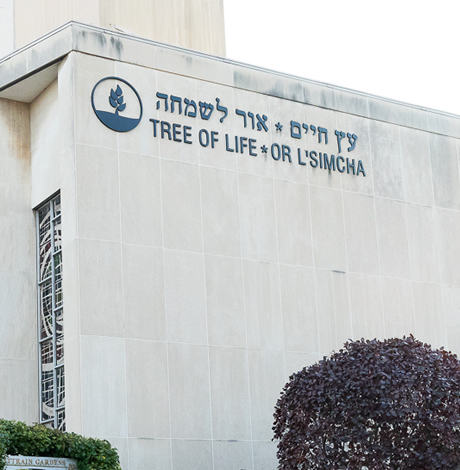

Tree of Life Synagogue in Poway, Calif. (Photo public domain)
Last Saturday morning, on the last day of Passover, anti-Semitic violence hit close to home when an armed, 19-year-old gunman opened fire at the Chabad Synagogue in Poway, Calif. Adding further pain to this tragedy is that fact that one of the injured, Noya Dohan, had moved with her family to San Diego from the city of Sderot in Southern Israel in search of safety.
This news affected me personally, as I had just visited Southern Israel through an Israel mission hosted by A Wider Bridge, an organization that works to expand LGBTQ inclusion in Israel. Israel is a fascinating and beautiful country with so much history, but what stayed with me the most was our time spent near Sderot and the border. While there, we met with LGBTQ families, communities, and activists, many of whom live in self-sustainable communities called a kibbutz. They also unfortunately live under constant fear of rockets being fired from Gaza and landing in their yard, their school, or their home. It was startling to see so many bomb shelters every few feet.
As a gay man, my community has also been affected by violence. When the Pulse nightclub attack occurred, many of us in the LGBTQ community felt our safety, security, and humanity was stolen from us. The only places we could go to fully express who we are became places with metal detectors, armed guards, and fear. But thankfully, our country, and our diverse communities came together to make sure a tragedy like that never happens again, and so far it hasn’t. Sadly, the same unified response has not taken place in combating anti-Semitism and violent attacks on Jewish synagogues in this country. There as has been a normalization of anti-Semitic rhetoric in our national politics, and in much of the media, that seems to only be pushing our two countries and its people, the United States and Israel, further apart.
I continue to draw hope from my A Wider Bridge Israel Mission experience. My fellow travelers were North American LGBTQ leaders and influencers from diverse political, religious, and cultural perspectives. Some in fact, held fairly negative views toward Israel. And yet, by the end of that trip, after experiencing and learning what Israel is all about, after meeting with people on every side of the conflict, and hearing from LGBTQ leaders doing amazing work on the ground, we emerged with a nuanced understanding of why Israel is so important, and why the issues being debated here about peace in the Middle East are more complex than many ideologues would have you believe. Even those left questioning the policies of the Israeli government understood the differences between challenging the policies and policy makers versus playing into old anti-Semitic tropes or questioning the right to Israel’s existence.
If there could be any fitting rebuke to the rising anti-Semitism in our society, it would be that all of us in the LGBTQ community come together in solidarity as we did after the Pulse shooting within our respective spheres of influence – liberal and conservative, religious and non-religious – to address and stop acts of anti-Semitism before any more have to suffer like those at Tree of Life and Chabad.
Matthew Craffey of Los Angeles is the chair of Log Cabin Republicans of California and has a bachelor’s degree in political science from California Lutheran University.
COMMENTARY
Dating during the holidays: Why cuffing season hits GBTQ men so hard
For GBTQ men, the holidays can be one of the loneliest times of the year. Seasonal depression ramps up, it gets darker earlier, it’s colder, and suddenly everyone around you seems to be coupling up

The holidays do something to us.
They pull at our hearts, our memories, our wounds, and our longing, all at the same time. And honestly? Dating during this season can feel like an emotional obstacle course.
For GBTQ men, the holidays can be one of the loneliest times of the year. Seasonal depression ramps up, it gets darker earlier, it’s colder, and suddenly everyone around you seems to be coupling up. It’s like the whole world collectively decided to jump into a cuddle puddle and forgot to send you the invitation.
And that’s why “cuffing season” is a real thing.
People want warmth. They want touch. They want a body next to them under the blankets while the rest of the world posts family photos with matching pajamas.
We want connection.
We want closeness.
We want someone to come home to when everything feels cold.
But here’s the deeper truth — especially for queer people: A lot of us didn’t grow up with magical holiday memories.
Many of us were rejected, or disowned, or made to feel “different,” and the holidays can bring all that trauma back like it’s happening in real time. While other families were singing carols, some of us were hiding in our rooms, praying no one would notice how “different” we were.
So now, as adults, having a partner during the holidays can feel like having a chosen family.
It feels safe.
It feels comforting.
It feels like someone finally picked you.
And there’s nothing wrong with wanting that. We all deserve love. We all deserve someone who makes us feel held.
But…
(you know there’s always a “but”)
We also have to ask ourselves:
Is this connection real? Or is it holiday loneliness wrapped in mistletoe?
Are we craving a partner, or are we craving comfort?
Does our heart need love? Or does it just need some warmth and self-compassion?
Because cuffing season relationships can be beautiful, but they can also be Band-Aids. Temporary. Convenient. Easy.
The real question is:
Do you want a partner for the holidays… or a partner for your life?
And if you’re single right now, as a matchmaker, I want to share something important:
You’re not behind.
You’re not failing.
You’re not missing some magical holiday checklist.
Being single during the holidays is not a punishment, even though it can feel like it when you’re sitting on your mom’s couch watching your siblings and cousins live out their Hallmark movie fantasy. Their husbands, their wives, their perfect kids, everyone in matching sweaters — and you’re like, “Cool, I’ll just be over here in the corner petting the dog.”
But disappearing into the extra bedroom and crying into a pillow isn’t your only option.
(Though if you need a five-minute cry, listen… you’re human.)
As a private matchmaker, here’s what I tell my clients — and myself! — every year:
1. You don’t need a partner to belong.
Chosen family is real. Friends are real. Community is real.
Sometimes your holiday joy comes from the people you choose, not the people you were born into.
2. You are allowed to create your own traditions.
A queer Christmas.
A gay Friendsgiving.
A holiday dinner with your spiritual family, your gym friends, your brunch crew, your book club.
Your joy isn’t limited to the house you grew up in.
3. Self-love is not a consolation prize.
It’s the thing that makes every relationship — including your future one — healthier.
4. The holidays aren’t a deadline.
Just because the world feels coupled doesn’t mean you have to rush into something just to survive December.
As a matchmaker, I see the other side too. And here’s what I want you to remember:
A lot of people do find love during cuffing season — real love, lasting love, beautiful love.
Because when loneliness rises, so does honesty. People open up more in the winter. They’re more vulnerable and willing to take a leap.
But whether you’re dating, single, complicated, or “it’s a long story,” know this:
You are not alone.
You are not behind.
And the holidays don’t define your worth.
If you end up in a relationship this season — amazing.
If you don’t — you still belong, you are still loved, and your story is still unfolding exactly how it’s supposed to.
And who knows…
Maybe next December, you’ll be the one cuddling up with someone who feels like home.
But for now?
Give yourself grace.
Give yourself compassion.
And give yourself permission to experience the holidays in the way that feels right for you.
You’re not broken.
You’re not missing anything.
You are enough today, this month, this season, all of it.
Daniel Cooley, LGBTQ+ Matchmaker & Co-owner of Best Man Matchmaking – California’s premier service for queer and trans men seeking emotional connections. Learn more here.
Join us at our Gay Singles Night on Thursday, December 3rd, at the Geffen Playhouse with LA Blade’s Matchmaker Daniel Cooley for an unforgettable evening! This evening includes a post-show talkback. Use code: LAB49T17 for $49 (includes per ticket fee) for Premium, Section A, or Section B seating. No ticket limit. No refunds or ticket exchanges. Visit geffenplayhouse.org to purchase your tickets. Code also valid for performances Dec.4-7, including weekend matinees.

Opinions
Mattachine Society in LA marks 75th anniversary
Seven gay men met in Edendale home on Nov. 11, 1950.

On Nov. 11, 1950, Veteran’s Day, seven homosexual men met in a home in what was then called the Edendale section of Los Angeles, now referred to as Echo Park. They came together, secretly, recruited by Harry Hay to found the Mattachine Society, the commencement of the long march to freedom by LGBTQ people in the United States. A statue needs be erected in L.A. to honor those seven men: Hay, Bob Hull, Chuck Rowland, Rudi Gernreich, Dale Jennings, James Gruber, and Konrad Stevens.
I still get chills as I read the oath of initiation taken into the Mattachine that day to the sounds of Pachelbel’s “Canon” softly playing in the background, an oath eventually heard around the world: “We are sworn that no boy or girl, approaching the maelstrom of deviation, need to make that crossing alone, afraid and in the dark ever again.”
In that oath about the “boy or girl,” the word “deviation” reverberates through a thousand years in the West of hetero supremacy and enforced heterosexualism with all that implies. All LGBTQ people were once that “boy or girl.” Thus began a core principle of LGBTQ community — we assume responsibility for each other.

Nov. 11, 2025, marks the 75th anniversary of that moment. As far as my information at this time, as a gay elder, I’m embarrassed to report to those seven gay ancestors: not a single event is planned in L.A. to commemorate that historic date, just as L.A. Pride occurred in WeHo on the 50th anniversary of the Stonewall Rebellion, the reason for Pride’s existence, without ever mentioning a word about Stonewall.
Why is that erasure of important LGBTQ history happening in L.A. and elsewhere? In previous articles in the LA Progressive, I have tried to explain that erasure by the Elite Capture of the LGBTQ community with top-down leadership, a total blackout of local news or investigative journalism, community members becoming spectators rather than participants, and new community moral values that reduce everyone to donors and consumers.
While a very short-lived effort was made in Chicago in the 1920s, which was quickly broken up by the police, the Mattachine represents the first successful attempt in the U.S. at organizing homosexual men and women. They used the oppressor’s word, “homosexual,” to describe themselves. After World War II, several of the men had been members of or had flirted with the U.S. Communist Party or were members of other progressive organizations, where they learned organizing skills, analysis of social problems, and secret organizing. It was that secret organizing, as necessary as it may have been, that became its Achilles’ Heel. Hay was kicked out of the CP by CP leader Gus Hall’s purge of known or suspected homosexual men and women after World War II.
The name “Mattachine” came from the word “matticini,” one of the names for jesters in royal courts of medieval Europe which Hay deduced from his research were homosexual men.
The Mattachine is important for more than just existing for three years (1950-1953). In its original organizing “manifesto,” written by Hay, for the first time in U.S. history, homosexuals identified themselves as an oppressed minority group. The document also declared that a hidden homosexual culture existed. Also, it implied that collective political action was needed. That collective political action eventually came from Mattachine’s grandchildren with the fire and fervor of the collective action of the Gay Liberation Revolution (1969-1985) — the Great Awakening. Will Roscoe’s “Radically Gay” will introduce you to this valuable historical written material of the Mattachine.
The Mattachine was a top-down organization based on a secret model of five levels that had been used by the Free Masons in 15th century Europe and later employed during World War II by the French Resistance. The original seven members were on level-five and newcomers on level one, not knowing who was on the levels above them. Such organization, it was felt then, was necessary due to the viciousness and life destroying consequences at that time by U.S. hetero supremacists if homosexual identity were ever made public. Until the 1969 Stonewall Rebellion and its aftermath, sane paranoia based on individual protection and survival characterized homosexual reality.
The Mattachine’s most important contribution then was the use of private discussion groups that gave gay men and lesbians, for the first time, an opportunity to talk with each other about their lives and how hetero oppression was directly impacting them. But these groups often met cautiously.
There was one discussion group in an apartment building in Hollywood that required members to arrive as fake male-female couples, the men wearing male attire and the women in dresses, lest the neighbors suspect that a homo group was meeting next door and alert the LAPD, who could soon be knocking on the door.
By late 1952-early 1953, it was reported that Mattachine had created almost a hundred discussion groups in California with about 2000 participants, a stunning achievement for the early 1950s. There were also Mattachine organizations happening in New York City; Washington, D.C.; San Francisco; and elsewhere. The discussion groups by then were taking on a more grassroots character with a wide range of people from various political proclivities and social classes, but, given the enforced racial segregation practiced in L.A. then, virtually all were white. There were whispers about their own publication.
Then, in March 1953, all hell broke loose when Paul Coates, a widely read newspaper columnist in the U.S., reported publicly for the first time the existence of the Mattachine in Los Angeles and the ties of some of its organizers to the Communist Party during the Red Scare period. I speculate that Coates was tipped off by J. Edgar Hoover and the FBI who, after their first priority, the Red Scare, focused on their second priority, the Homo Scare.
The Mattachine was thrown into turmoil, not knowing whose outing was next, and the seven level-five men unmasked themselves.
At a meeting of the Mattachine at the First Unitarian Church, then on Crenshaw Boulevard, in the Spring of 1953, Hay and other founders resigned in the best interest of the organization, which was taken over by conservative Hal Call and moved to San Francisco, which is a sad story for another time. In my many dialogues with Hay about this period, he always referred disdainfully to the San Francisco group as the
“Second Mattachine,” to clearly differentiate it from the first.
Out of that chaos, in Los Angeles was formed ONE, Inc., which ushered in the conservative, Republican-led Homophile period (1953-1969), centered in Los Angeles, that recorded successes and failures which I have written about previously in the L.A. Progressive.
One essential way of understanding the Mattachine and Homophile periods is through the lens of the historiography of liberation movements. Both the Mattachine and Homophile years represented what is seen as “secondary resistance,” which involves the preparation of an oppressed people for liberation through discussion, writing, education, and some organizing of an elite nature. The “Big Bang” of the Gay Liberation Revolution was “primary resistance,” which involves direct action against the power of the oppressor, replaces it, and proactively creates a new sense of community free of the previous oppression. Or so they say.
One of my teachers, Malidoma Some, taught me about the importance of honoring ancestors as an essential ingredient of maintaining a healthy community. He also taught me about eldering. Among the Dagara people in Burkina Faso, from which he came and was an initiated shaman and initiated elder (also with two earned Ph.Ds. from the Paris Sorbonne University and Brandeis University), one of the important roles of elders was to scold the village for any shortcomings in fulfilling their responsibilities. Only elders had the authority to do that scolding.
As a Gay Tribal Elder, I send out a potential scold particularly to functioning and conscious LGBTQ adults and youth in the L.A. community. You are the boy or girl the Mattachine swore to protect. You are the great, great grandchildren of those pioneers. You have ancestor responsibilities. You might bring shame to a community by disregarding that important legacy. Being me, I also warmly say to you that you can always redeem yourselves. The 75th anniversary year of the Mattachine is just beginning on Nov. 11, the founding date in 1950. There is time during this coming year to be accountable in some notable way.
As the remarkable poet Kevin Young wrote recently, “the dead won’t let/us be.”
Don Kilhefner, Ph.D., has been a gay community organizer for the past 60 years in Los Angeles, nationally, and internationally.
COMMENTARY
Abandoned by the system: How CHLA turned its back on trans patients
Lu’s personal story captures the emotional and medical fallout of CHLA’s decision, exposing the broader issue of institutional retreat under political pressure.
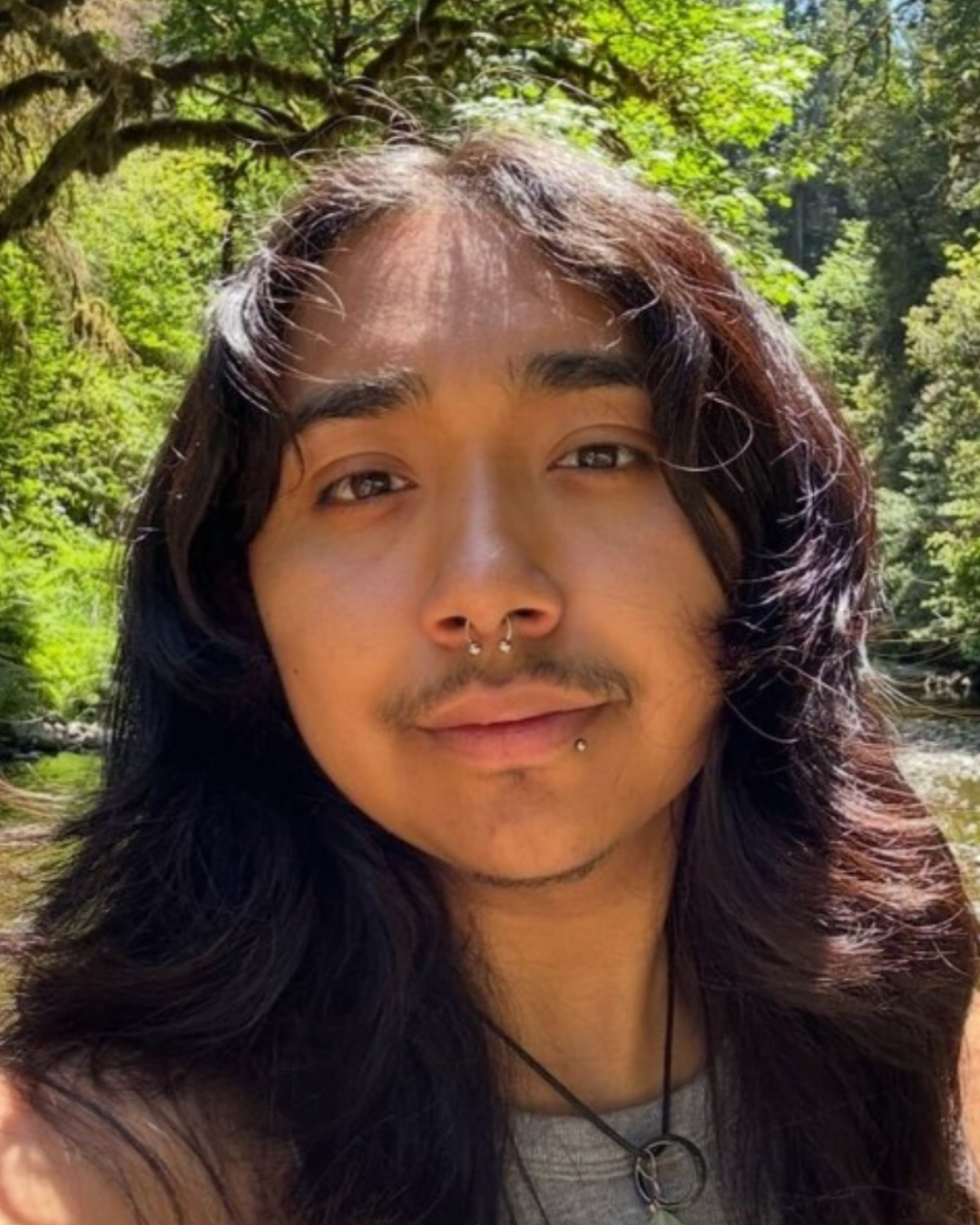
Lu Orona recounts his experience beginning transition at Children’s Hospital Los Angeles (CHLA) — the same institution that recently announced it would no longer provide gender-affirming care, even to young adults who have relied on it for years.
When I was 17, I began my medical transition at Children’s Hospital Los Angeles (CHLA). Getting there took more than a year of obstacles: endless referrals, canceled appointments, and being told again and again that “we don’t do that here.” CHLA became my first real opening, the place that finally treated me as someone who deserved care instead of as a problem to be managed.
Before that, I had lived in a body that never felt like mine. I didn’t know what safety or ease felt like until I began testosterone. A year later, CHLA approved me for top surgery. For the first time, I could breathe deeply without the weight of a binder or the heavier weight of a healthcare system that had long rejected me. It was the first time I felt whole.
At my first consultation, I was shaking, expecting another rejection. Instead, I was treated with dignity. The day I gave myself my first testosterone injection. I cried, not from fear, but from the overwhelming sense that I was finally allowed to exist as myself. It was the beginning of a freedom I had been told I’d never have.
In the months that followed, the suicidal thoughts that once defined my days began to quiet. For the first time, I felt alive rather than just enduring life. I could laugh with friends, feel the sun on my skin, and experience my body as my own. CHLA had become my anchor in a world that so often told me I didn’t belong.
Then, this summer, that lifeline was cut.
In July, CHLA announced it would stop providing gender-affirming care, not just for minors, but for young adults like me. At 23, after five years of consistent care, I was told that my treatment would end. The same hospital that once helped me feel safe had withdrawn that safety without warning.
The decision is cruel in its inconsistency: CHLA continues to offer hormones and surgeries to cisgender patients, yet those same treatments are now off-limits for trans people. The hospital’s public statement framed the change as a policy for minors, but I stand as living proof that young adults are also being abandoned, with consequences that are immediate and devastating.
Losing CHLA doesn’t simply mean finding another doctor. It means starting over in a healthcare maze filled with waitlists, insurance denials, and clinics that treat trans care as an afterthought. I’ve lived this before. When I lost access to testosterone due to an insurance gap, my body shifted rapidly, my periods returned, my hormonal balance collapsed, and my mental health deteriorated. It took half a year before I felt stable again.
This is not only about healthcare logistics. It’s about trust, and how fragile it becomes for people who already face discrimination at every level of the medical system. Trans people experience higher rates of anxiety, depression, and trauma precisely because our access to care is never guaranteed. When an institution like CHLA walks away, it reinforces a message that has haunted us for decades: our health is conditional, our lives negotiable.
Accountability must come now, not later. If one institution retreats, others have a moral duty to step forward. Leadership in healthcare cannot mean showing up for Pride Month and disappearing when controversy arises. It must mean sustained, public, and enforceable commitments to trans patients—commitments that do not bend under pressure. Symbolic support is no longer enough. What we need are permanent policies and protections that make our care non-negotiable.
This responsibility extends beyond hospitals. Lawmakers, insurers, and the public must recognize that gender-affirming care is not elective. It is evidence-based, essential, and for many of us, life-saving. When it is stripped away, people suffer and some will not survive. The impact reaches far beyond youth, affecting young adults like me who are left without options mid-treatment.
This moment cannot be allowed to fade into another headline. Each closure, each withdrawal of care, pushes trans people back into silence and despair. CHLA may have stepped away, but I will not disappear with it.
We deserve a future in which trans people do not merely survive but thrive. That future is not an abstraction; it is possible, and the fight for it begins now.
Lu’s op-ed was presented on behalf of the California LGBTQ+ HHS Network in honor of Transgender Awareness Week 2025
COMMENTARY
Uplifting small businesses uplifts us ALL
If we want to keep West Hollywood’s economy strong, we have to make sure our systems are helping, not hindering, the people who invest here.

By West Hollywood Councilmembers John M. Erickson and Danny Hang
When we ran for City Council, we both heard the same message repeatedly from residents and small business owners alike: it’s too hard to open a business in West Hollywood. From boutique owners on Santa Monica Boulevard to new café operators on the Eastside, people shared stories of navigating a complex maze of permits, design reviews, and approvals that can take months — sometimes more than a year — to complete. And if we are going to keep out the big box stores, create a steady revenue stream that helps fund our wonderful services, and protect our small-town charm, something needs to change.
That’s why we’ve coauthored a new policy initiative to streamline West Hollywood’s business permitting and signage regulations, making it faster, clearer, and more predictable for entrepreneurs to get up and running. This process in no way prevents community participation—it encourages it by putting people first.
Our small businesses are what make West Hollywood so special. They bring creativity, culture, and community to every block. But every month that a storefront sits empty or an opening is delayed costs jobs, tax revenue, and local vibrancy. If we want to keep West Hollywood’s economy strong, we have to make sure our systems are helping, not hindering, the people who invest here.
Cutting Red Tape, Not Corners
The City has already taken important steps through its Permitting Enhancement Initiatives, such as the Permit Navigator Program, which provides one-on-one support to guide business owners through the process, and the Over-the-Counter Plan Review, which allows low-impact projects to get same-day approval. These programs have helped, but it’s time to go further.
Our proposal directs City staff to take a comprehensive look at how we can streamline and modernize the entire permitting process, from tenant improvements to signage, and bring back recommendations to the City Council by Q1 2026 or as part of the next fiscal year’s work plan.
That review will include looking at how long it currently takes to open a new business, identifying where the delays are, and setting clear performance goals to measure progress. For example, we’re suggesting a target of getting 90 percent of new non-food businesses open within 120 days of application and food businesses within 180 days. These goals are ambitious but achievable, and they’ll give everyone a clear sense of accountability.
Updating Outdated Signage Rules
Another key part of this effort is updating West Hollywood’s sign ordinance. Our city has one of the most creative business communities in the country, yet many of our sign regulations were written decades ago and no longer reflect more effective, 21st-century norms for businesses to advertise and express their identity today.
We’re calling for staff to explore how signage rules can be modernized and streamlined, while still upholding West Hollywood’s design standards and visual character. That might mean allowing certain types of signs to be approved administratively rather than going through multiple rounds of review, clarifying what qualifies as a “creative sign,” and ensuring our rules keep pace with advances in technology and accessibility.
By making these updates, we can reduce unnecessary delays for business owners while still protecting what makes our city visually iconic.
Listening to Businesses, Measuring Success
This process will be collaborative. We’re directing staff to engage directly with the West Hollywood Chamber of Commerce, small business owners, local tenants, and neighborhood groups to ensure we’re identifying the right solutions and focusing on what matters most to those directly impacted. Again, this proposed process encourages robust community participation.
We’ll also ask for data (one of the most important tools we have at our disposal), a snapshot of recent permit applications, how long they took to process, and where improvements can be made. This transparency will create a baseline for tracking success over time, ensuring our efforts are grounded in results, not rhetoric.
Building on Our Progress
This initiative builds on the work of the Small Business Initiative Implementation Plan, adopted by the Council in 2023, which set out a roadmap to make West Hollywood more business-friendly (after all, we were named the most business-friendly city in 2021 by the Los Angeles County Economic Development Corporation). It also aligns with California’s AB 671, which now requires cities to expedite plan reviews for restaurant tenant improvements.
Together, these reforms will help ensure that West Hollywood continues to be a place where businesses — especially small, locally owned ones — can thrive.
Time for Swift Action
We’ve heard the feedback. We know the challenges. It’s time to act. Now.
Streamlining the permitting process isn’t just about efficiency; it’s about equity. Small business owners, especially first-time entrepreneurs and people from underrepresented communities, often don’t have the resources to navigate a slow and complicated system. By simplifying the process, we’re creating more opportunities for everyone.
When our local businesses succeed, our community thrives. We’re proud to bring forward this initiative, and we’re committed to working with our staff, local partners, and residents to make doing business in West Hollywood faster, clearer, and fairer for all.
John Erickson is a Councilmember and Former Mayor of the City of West Hollywood and a candidate for California State Senate District 24.
Danny Hang is a Councilmember of the City of West Hollywood and serves on the West Hollywood City Council Subcommittees for the Laurel House Project and Hart Park Phase II Improvements.
Commentary
Cities can’t improve the future with yesterday’s rules
California cities can’t keep building 21st-century infrastructure with 20th-century rules. It’s time to give local governments the flexibility to deliver for the people they serve.

Editor’s note: This piece is a follow-up to Councilmember Erickson’s August 12 op-ed, “Why California Must Remove the Roadblocks to Safer Streets,” in the Los Angeles Blade.
When I wrote earlier this year about why California must remove the roadblocks to safer streets, I focused on what local governments like West Hollywood can do to fix our own processes. At our October 20 Council meeting, I’m advancing a proposal that will streamline how we plan and deliver infrastructure projects to move traffic better and make our streets safer—without unnecessary delays.
But sadly, this proposal is just not enough. Local reform can only go so far, as California’s cities are bound by outdated state contracting laws that tie our hands, waste taxpayer money, and make it harder to deliver the improvements our residents deserve.
If we’re serious about making our communities safer, cleaner, and more sustainable, we need statewide reform of the Public Contract Code—and that means allowing every city and county to utilize a best value contracting method for public projects.
Modernizing How We Improve Infrastructure
Under current state law, most cities must award public works contracts based solely on the lowest bid. On paper, that sounds fair. In practice, it often means that the lowest price wins over the best qualified bid—leading to cost overruns, project delays, and endless change orders. It’s the government equivalent of buying the cheapest option first and paying more for it later.
Best value contracting flips that equation. It allows cities to weigh qualifications, experience, sustainability, and innovation—not just price—when selecting contractors. This approach has already been proven successful by counties, universities, and some charter cities. But most local governments in California don’t have permanent access to this tool.
That needs to change.
If cities like West Hollywood could permanently use best value contracting, we could deliver safer streets, park improvements, and infrastructure upgrades faster, more efficiently, and at lower cost to taxpayers.
Cutting Bureaucratic Bloat and Building Trust
Reforming the Public Contract Code to make best value contracting a statewide option would do more than save time and money—it would restore trust in government. Residents are frustrated by projects that take years to design and even longer to build. The truth is, much of that delay is built into the system itself: outdated rules that reward red tape over results.
By embracing a best value model, we’d reduce bureaucratic bloat, empower city staff to focus on outcomes, and give communities more transparency in how projects are delivered—with the best overall outcome. It’s smart, responsible government—and it’s long overdue.
From Local Action to Statewide Change
West Hollywood is doing its part. Our “Removing Infrastructure Roadblocks” policy will streamline local project timelines and prioritize safety. But real, lasting change requires partnership from Sacramento.
It’s time for the State Legislature to update the Public Contract Code and give every city the permanent ability to use best value contracting. With that change, we can finally build faster, smarter, and fairer—while saving money and lives along the way.
The path to safer streets starts in our cities, but the power to clear the roadblocks lies with the state. Let’s make it happen.
On Monday, October 20, the West Hollywood City Council will consider my proposal to remove local infrastructure roadblocks and set a new model for how cities can build more efficiently. I’m inviting everyone who believes in safer, smarter, and faster investment in our public spaces to show up and make your voice heard.
You can attend in person at the West Hollywood City Council Chambers (625 N. San Vicente Blvd.) or submit a public comment online at www.weho.org/agendas. Every voice matters — your input helps ensure we build a city and a state that works for everyone.
The path to safer streets starts here in West Hollywood. Let’s take that first step together — and let’s make sure California clears the roadblocks statewide.
California cities can’t keep building 21st-century infrastructure with 20th-century rules. It’s time to give local governments the flexibility to deliver for the people they serve.
John Erickson is a Councilmember and Former Mayor of the City of West Hollywood and a candidate for California State Senate District 24.
COMMENTARY
From rhetoric to persecution: When the State labels trans people as terrorists
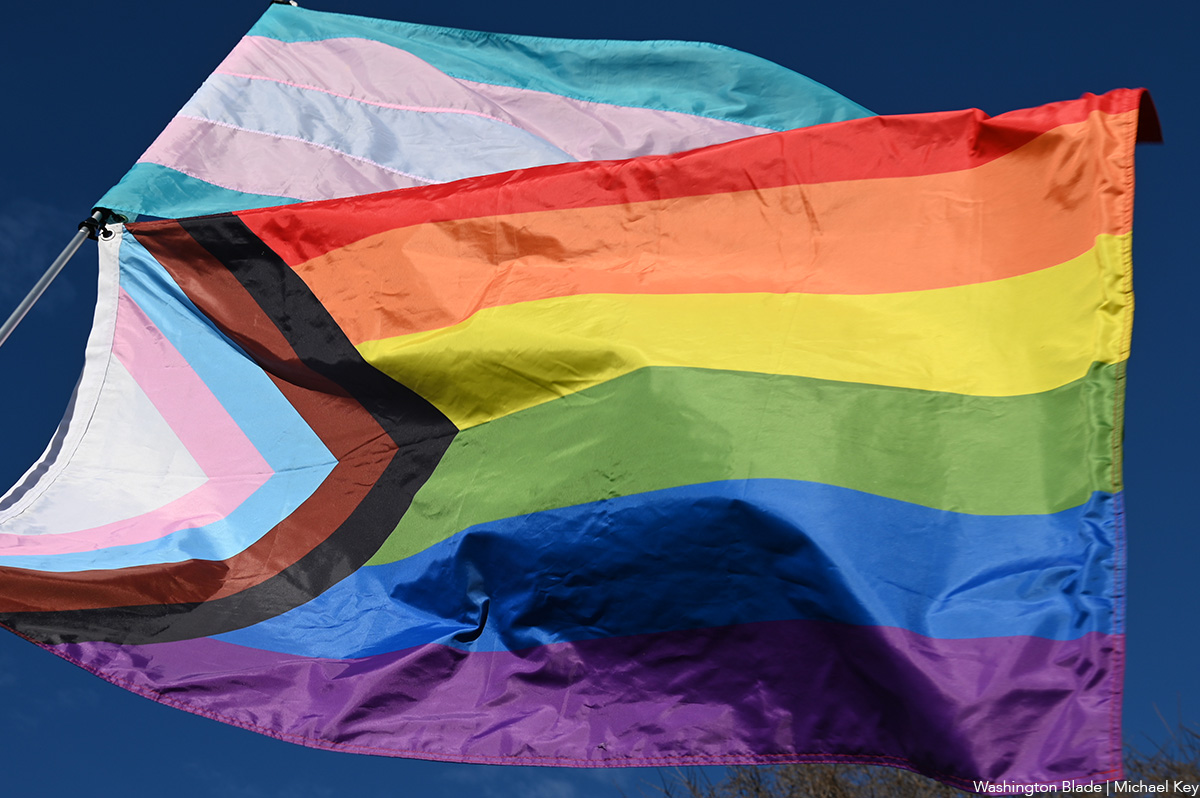
In Los Angeles, where rainbow flags line Santa Monica Boulevard and queer communities carve out space to thrive, it can feel surreal that the federal government might one day classify transgender people as terrorists. Yet this no longer belies a paranoid fantasy. Reports surfaced this fall that the FBI is considering whether to categorize trans people under a newly minted threat label called “Nihilistic Violent Extremists”. This came in the wake of conspiracy theories that Charlie Kirk’s assassin was trans–theories that were later debunked. The Heritage Foundation, through its Project 2025 blueprint, has openly suggested that “transgender ideology” belongs in the same basket as terrorism. What sounds like fringe demagoguery is being whispered in the corridors of federal power.
The danger of such framing is terrifying. When governments confuse identity with ideology, they are laying the groundwork for persecution. We have seen this playbook before. In the 1930s, Adolf Hitler’s regime did not begin with concentration camps. It began with words. Jews were depicted as corrupting influences, dangerous parasites, and threats to Aryan purity. Bureaucratic edicts stripped them of jobs, banned them from public schools, and erased their presence from civic life. This sort of parallels what is happening to trans people right now–we have been banned from the military, we can’t use the bathroom of our choosing, and we are being denied critical healthcare. A rhetorical shift–from neighbor to danger–makes it possible for ordinary citizens to tolerate, and even participate in, their eventual destruction.
On his first day back in office, Trump signed Executive Order 14168, erasing gender identity from federal recognition, cutting funding for care, and redefining sex as fixed and immutable. Another order, 14190, criminalizes teachers who affirm a student’s pronouns or facilitate their social transition, equating simple recognition with exploitation. These are not abstract debates over language. They are policies that dictate whether people can live authentically, whether youth can find safety in schools, and whether families can see their children treated with dignity. To then float the idea of designating trans people as extremists is not an isolated thought experiment. It is a continuation of a campaign already intent on erasing us.
Just as Hitler began by classifying Jews as subversives, today’s political leaders risk classifying transgender people as national security threats. In both cases, identity is treated as a contagion. In both cases, the state deploys the language of danger to justify measures that would otherwise be unthinkable. And in both cases, the consequences for silence are catastrophic. When trans existence is conflated with terrorism, it becomes easier for ICE to surveil us, for policymakers to justify banning our gatherings, and for agencies to deny us access to the very structures of public life. What begins as words in a memo can end in barbed wire, if history is any guide.
Los Angeles knows better than to believe itself immune. The city has long been a sanctuary for queer and trans people, a place where art and activism have fused into survival. Yet federal classifications do not stop at county lines. A Pride march in West Hollywood could be branded a security risk if Washington decides that trans identity itself is extremist. A parent advocating for their child at a Los Angeles school board meeting could suddenly find their activism logged in a federal file.
The stakes of this moment are enormous. If the American public shrugs at the possibility of transgender people being labeled “nihilistic terrorists,” we risk normalizing the logic of persecution. And if that logic hardens, it will not stop with us. Once a regime learns to brand identity itself as dangerous, it will reach for new scapegoats to sustain its power.
Los Angeles has always been a city of resistance, a place where queer life refuses to be hidden, a place where silence is not an option. That spirit must animate our response now. To accept these federal whispers as mere rhetoric is to betray the lessons of history. To resist them is to defend not only transgender lives, but the integrity of democracy itself.
Words prepare the ground for action. Plenty of dictators have taught us that. The only question is whether we will recognize the warning signs in time.
Isaac Amend is a writer based in the D.C. area. He is a trans man and was featured in National Geographic’s “Gender Revolution” documentary. He serves on the board of the LGBT Democrats of Virginia and is a Yale graduate. You can follow him on Instagram at @isaacamend
Commentary
PrEPARING California for the future and better supporting those living with HIV
AB 554 is a huge step in the right direction; however, without consistent leadership from policymakers, those living with HIV will continue to be the first on the budget chopping block.

When I learned I was living with HIV nine years ago, there were a lot of questions to be answered: how will I access treatment? Will I feel safe and respected by my care team? What does stigma look like for me in the fourth decade of the HIV epidemic?
While I was fortunate to have a wonderful team of case managers and health care providers who guided me through an unfamiliar and complex medical system, I’ve heard countless stories of people fighting tooth and nail just to find appropriate care, let alone treatment.
Our country’s labyrinthine, convoluted health system is cluttered with obstacles like prior authorization and step therapy. Both of which needlessly delay access to health care by imposing vague requirements and/or forcing patients to “fail” a series of medications before they are granted access to the one actually prescribed by their physician. For game-changing HIV prevention drugs like PrEP, these hurdles endanger lives. Combined with our current federal landscape being incredibly antagonistic (i.e., the Trump Administration trying to gut $1.5 billion in HIV prevention funding, among a laundry list of offenses), the LGBTQ+ community is facing disproportionate hardships that are exacerbating disparities and contributing to further stigmatization.
Thankfully, California policymakers are doing their part to protect our community. Assembly Bill 554, authored by Assemblymember Mark González (D-Los Angeles), follows in the footsteps of nine other states by ensuring coverage for all long-acting, injectable drugs used for PrEP and PEP. The bill “safeguards patient and provider choice” by eliminating cost-sharing and expanding access to a wider range of ARV medications to help bolster medication adherence rates. It also ensures coverage for future formulations of ARV drugs that are better at making HIV undetectable and untransmissible.
PrEP (pre-exposure prophylaxis) and PEP (post-exposure prophylaxis) are effective regimens for preventing the transmission of HIV when taken as prescribed. AB 554 enshrines quick access to these treatments, satisfying calls for health equity, especially for Black and Latino Californians, who face disproportionate transmission and infection rates.
AB 554 is a huge step in the right direction; however, without consistent leadership from policymakers, those living with HIV will continue to be the first on the budget chopping block. Just last week, the California Legislature passed a budget trailer bill (AB 144) that includes provisions to divert funds from the AIDS Drugs Assistance Program Rebate Fund toward general state operations.
California policymakers can’t say they’re countering the Trump Administration and supporting the HIV community if they’re also ripping the rug out from underneath us. AIDS Drug Assistance Programs are lifelines – they normalize diagnoses, fund direct services, and help uninsured and underinsured patients access essential care.
Ironically, while AB 554 will build upon the work of ADAPs to eliminate prohibitive barriers, AB 144 will steal funds from the program to instead boost state revenue. ADAPs already operate from a very small annual revenue of fixed federal funding awards per state. States taking more money away from these critical programs will threaten their ability to serve HIV patients. Moreover, these dollars are statutorily prohibited from being used for non-HIV care by Title II of the Ryan White CARE Act.
California is destined to repeat the sins of the past unless Governor Newsom steps in. For too long, those living with HIV have been isolated, cast aside, leveraged for political gain, and dropped soon thereafter if something better comes along. We are not budget dust, we are not pawns in a political game, we are real people with real voices, and we’re asking Governor Newsom to do what’s right: redline the ADAP provisions from AB 144 and sign AB 554 into law.
California can lead the nation in doing what’s right for all communities. But it starts with policy, and we have to make sure policies are centered around those they impact.
Kalvin Pugh is the state policy director for the Community Access National Network, a national 501(c)(3) nonprofit that works to improve access to health care services and supports for people living with HIV/AIDS and viral hepatitis through advocacy, education and networking.
Commentary
Pride & promiscuity: What the current face of gay sex culture says about us
A dive into the historical, social, and psychological motivation that drives us into each other’s arms.

As gay men, are we having more sex than our fore-daddies or just more open about it? Between Grindr dings that hit harder than Double Scorpio, PrEP prescriptions as our daily gay-ly vitamin, and the ever-present anxiety of FOMO, I think it’s fair to ask, is hooking up becoming a numbers game, more focused on quantity vs. quality, for many of us ‘mos?
For eons, gay sex has been both a subject of fascination and moral panic for those on the hetero side of the picket fence. But the conversation has shifted. Today, the questions come less from pearl-clutching conservatives and more from within our own community. How much is too much? Are we liberated yet? Are more and more of our gay brethren basking in the waters of heteronormativity? And to what extent are our sex lives driven by libido, validation, or the simple fact that we can?
Let’s start with the obvious culprit: technology. Of course, as gay men, the first thing that we did following the birth of the smartphone was create a way to see all of the fair-game dick within a one-mile radius. We were the first to adopt hookup apps as essential social tools, from the early days of Grindr to the onset of Sniffies. According to research cited by Gay Counsellor, compulsive use of apps can mirror patterns of behavioral addiction, where “likes” and “messages” stimulate dopamine in ways eerily similar to gambling. The buzz of a notification becomes less about actual intimacy and more about self-worth. Sex as currency, matches as validation.
A TIME article warned in 2014 that hookup apps might be “destroying gay relationships,” arguing that the sheer efficiency of digital cruising left little incentive for building intimacy. Why invest in a partner when you can have instant access to some NSA ass five feet away? It’s the Amazon Prime of getting off – quick delivery, same-day service.
I think that these critics are missing a nuance here. Apps aren’t inherently bad; they are simply adding a Cialis to what’s already in our culture. If we already treat sex as a form of transactional validation in normal life, apps inject that insecurity with steroids.
Then there’s PrEP, the little blue pill that revolutionized sexual health and, in turn, our sex lives. Since its FDA approval in 2012, Truvada has been both a miracle and a lightning rod. A CUNY study found that PrEP has fueled perceptions of promiscuity. The assumption is that biomedical safety nets invite reckless raw-dogging abandon, reinforcing the stereotype of gay men as hedonistic ho-bags.
But the data tells a more complicated story. Research published in the Journal of Medical Internet Research (2022) suggests that while PrEP use does correlate with higher numbers of sexual partners for some, it also fosters healthier discussions about safety and reduces anxiety around HIV. Translation: PrEP doesn’t make people slutty, it makes them feel secure. If this sense of sexual security emboldens them to embrace their sexuality more fully, is that really a problem? Or is it just a shift in norms?
Of course, none of this exists in a vacuum. As The Conversation notes, homosexuality may have evolved as much for social bonding as it did for reproduction. Historically, gay sex wasn’t just about pleasure but also survival, solidarity, and even networking. In the years after Stonewall, sex was political. It was a sweaty form of protest against heteronormative repression, a celebration of community in defiance of shame.
But in 2025, sex has also become… a competition. Liam Heitmann-Ryce-LeMercier’s essay on Medium critiques how queer culture sometimes conflates liberation with obligation. Promiscuity is framed less as personal choice and more as proof of authenticity. Don’t want to sleep around? Then maybe you’re repressed, prudish, or not “gay enough.” The pressure cuts both ways – to have sex, to crave sex, to keep up with everyone else’s sex.
And here’s where FOMO comes in. For every wild Saturday night Instagram story, there’s someone scrolling at home, wondering if they’re missing out – not on an orgasm, but on acceptance and belonging. The sex itself is just the trophy to the win, secondary to the validation of being chosen, the real prize.
So what actually drives this culture? Libido is undoubtedly up in this. Gay men, like all people, are wired with sexual impulses. But the psychological factors are harder to ignore. Validation looms large. The “yes” of a stranger affirms desirability. The “no” can often feel like a reflection of our worth. Ego magnifies the stakes, turning sex from a dance in the sheets into a scoreboard.
A telling study in the International Journal of Environmental Research and Public Health posited that compulsive app users often report using sex as a coping mechanism for loneliness and low self-esteem. Which inevitably raises the question – are we having more sex because we want it, or because we need to prove something, whether that is to ourselves and to others?
No discussion of queer sex culture or sex as a whole would be complete without tackling entitlement. Many of us know the type: the man who can’t take “no” for an answer, who interprets rejection as an insult, who cloaks his bruised ego in accusations of rudeness or exclusion.
Here’s the truth: just because you hand out a cookie or two doesn’t mean you have to share with the class. Consent is not a punch card system, and no one is entitled to anyone else’s body. Yet too often, rejection is reframed as cruelty, with aggressors painting themselves as victims. Is it gaslighting? Maybe. Is it delusion? Almost certainly. The lesson is simple: declining sex doesn’t make you a monster, and other people’s inability to handle rejection doesn’t make it your problem. Autonomy is not negotiable.
So are gay men more promiscuous today? In some ways, yes. Apps have streamlined access, PrEP and doxy have lowered risks, and cultural stigma is withering. But promiscuity isn’t the villain or the hero of this story. It’s a spectrum, shaped by psychology, politics, history, technology, and so much more.
For some, sex is liberation; for others, it’s compulsion. For some, it’s community; for others, it’s ego. The pearl-jammed peril lies not in the sex itself but in mistaking quantity for quality, validation for value, or pressure for choice.
Our challenge isn’t to moralize but to contextualize. To ask ourselves (and only ourselves) not how much sex we’re having, but why, and to respect that everyone’s reasons for getting down are their own. And to remember that liberation isn’t measured by tallies on a jockstrap waistband but by freedom from stigma, coercion, and shame. Stay safe and stay self-aware, my fellow bedfellows.
COMMENTARY
From rhetoric to renewal: How we heal America together
We must reckon with the fire we’ve built around politics

Charlie Kirk was no stranger to controversy. He thrived in it. He built his career on standing at the microphone in crowded lecture halls and telling skeptical young progressives to “prove me wrong.” At just 18, he saw a vacuum on the political map and filled it, co-founding Turning Point USA, which now calls itself the largest conservative student movement in the nation. His reach stretched from high school classrooms to the White House, his podcast drawing millions, his organization boasting thousands of programs, and his presence sparking protests wherever he spoke.
Kirk’s sudden and tragic death has left America reeling. For his followers, he was a bold voice who gave them language to express frustration with the left. For his critics, he was a provocateur who stoked division for profit. But for all of us, his passing should force us to reckon with the fire we’ve built around politics. Because let’s be honest: it isn’t just rhetoric anymore. Words are hardening into violence. Ideas are becoming weapons. And a democracy that devours itself from within cannot endure.
America is fractured. Our civic life feels like it’s splintering beneath our feet. Whether you are gay or straight, trans or cisgender, conservative or progressive, the same truth echoes: hate is taking lives. Too often, leaders build their platforms not by lifting people up but by tearing communities down.
We’ve seen how quickly careless words can spiral into fear, how easily fear becomes cruelty, and how cruelty ends in tragedy. This isn’t about one man’s career or ideology. This is about us — a country that keeps choosing division over dignity, suspicion over solidarity. That choice is killing us.
In this moment, America needs courage. And often, that courage comes most clearly from the communities that have borne the brunt of hate the longest. LGBTQ Americans know what it means to be targeted, to be legislated against, to have their very existence debated in the public square.
And yet, despite that, queer communities have built joy. They’ve built love. They’ve built families, art, churches, businesses, neighborhoods — not in spite of being different, but because difference can be beautiful. That resilience holds a mirror up to America: this is what it looks like to endure, to rise above rhetoric, to keep creating hope even when the world insists you don’t belong.
It’s not the LGBTQ community that needs to be convinced of America’s worth. It is America that needs to be reminded of its own soul.
Dr. Martin Luther King Jr. spoke of a dream where children of every race could sit side by side in dignity. Today, that dream must stretch wider. It must include queer children who deserve safety, trans youth who deserve freedom, and every marginalized person who deserves to breathe the air of equality without fear.
But make no mistake: this dream will not be realized by vilifying those with whom we disagree. It will not be achieved by mocking faith or silencing the voices of the right. It will come only when conservatives and progressives, red states and blue, stand together and admit that diversity is not America’s weakness — it is America’s genius.
To those on the far right who fear LGBTQ neighbors: your fear is misplaced. The call is not to give up your faith or your freedom. It is to recognize others’ right to theirs. And when we recognize each other’s humanity, the promise of America is finally fulfilled.
What we must do now is clear. If America is to survive this age of division, we must begin by reclaiming empathy. That means looking beyond the noise of politics and policy to truly see one another as human beings — neighbors, families, and communities whose dignity is not up for debate. We must protect the vulnerable, standing firmly with LGBTQ youth, immigrants, people of color, and all who have been pushed to the margins of society. Their safety and belonging cannot be treated as optional. We must celebrate difference, treating diversity not as a problem to be managed but as one of our nation’s greatest gifts. Our strength has always come from the kaleidoscope of identities, cultures, and voices that call this country home. And finally, we must hold speech accountable. Words shape worlds. When leaders choose language that harms, divides, or stokes fear, they corrode democracy itself. When they choose words that heal and summon courage, they open the door to renewal. Only when we embrace these commitments can we move from rhetoric to renewal—and begin the work of healing America together.
Charlie Kirk’s life was proof that words carry weight. His death must remind us that the weight of our words can no longer crush the spirit of this country. The question before us is not whether America will be divided — it already is. The question is whether we will summon the courage to heal it.
The time for slogans and soundbites has passed. The time for renewal is now.
Because if America continues to treat difference as danger, then democracy itself will wither. But if we choose to see difference as destiny, then we can build a nation strong enough to hold us all. That choice is not theirs. It is not mine. It belongs to all of us. And history will remember what we decide. Only when we embrace these commitments can we move from rhetoric to renewal—and begin the work of healing America together.
Emma Roshioru is a senior at Virginia Tech majoring in Political Science and Public Relations. Dr. James Bridgeforth is an independent, nationally syndicated columnist whose work has appeared in the Los Angeles Blade, The Washington Post, and the Washington Examiner.
Commentary
Don’t miss the liberation in the silencing of Charlie Kirk
In the aftermath of the assassination, we are now drowning in a pool of speech violence that could lead to an American catastrophe.
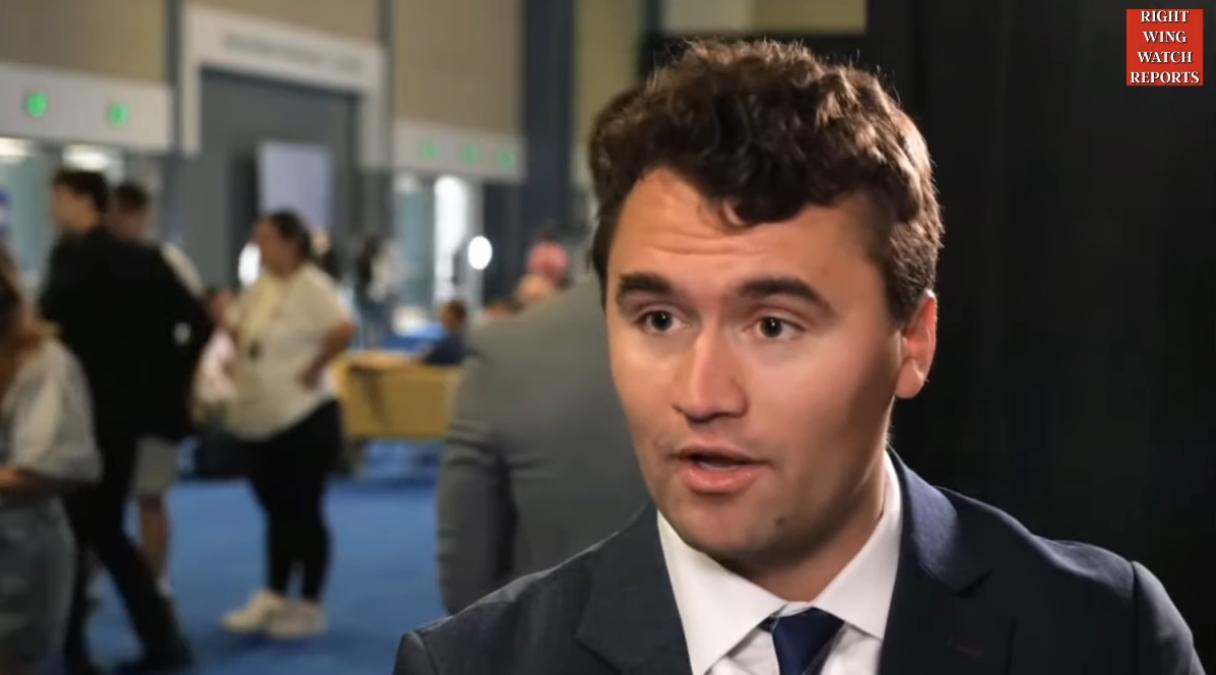
Trans advocates have argued for years that anti-trans speech leads directly to anti-trans violence, and were eye-rolled to oblivion. Charlie Kirk, whether as a mouthpiece for what politicians dared not say out loud, or as a hype man keeping the politics of resentment ever inflamed, built a career out of weaponizing right-wing talking points, fueling a culture of violence that ultimately killed him, and now threatens all of us.
The trail of harm caused by Kirk’s rhetoric is not abstract—it lines up with real blood and real deaths. When he blasted the phrase “China virus” into cultural discourse—parroted days later by Trump—anti-Asian hate crimes spiked. His COVID misinformation spread right alongside hundreds of thousands of needless fatalities. When he compared abortion to the Holocaust, he sanctified the moral panic that cleared the way for Roe v. Wade’s destruction—and pregnant people now die totally preventable deaths like it’s 1972 again.
Kirk also called gender-affirming care for youth “child mutilation,” language now enshrined in legislation that has severed a lifeline for vulnerable kids and their families. He urged that trans people be “taken care of the way society handled us in the 1950s and 60s,” that is, with lobotomies, shock therapy, and police persecution. He spent his last moments on earth promoting the conspiracy theory that trans people make up an imaginary majority of mass shooters—classic fascist scapegoating with the obvious aim of inciting more violence against trans people.
The irony cannot be overstated that his actual last words, spoken as he was shot, minimized the human toll of gun violence. In death, Charlie Kirk proved the point that sowing violence with words reaps real-world tragedy. He gave trans activists the last word on the matter forever.
And now we know the truth: Kirk was not killed by a leftist or a trans activist, but by Tyler Robinson—a young white man evidently radicalized by the toxic masculine internet culture that Kirk and his allies normalized. When you cultivate a culture of hate and fear, when you normalize conspiracy and scapegoating, when you insist that violence is the only solution, eventually your own people will turn those weapons back on you. And your personal world is left bereft and traumatized, just like the 47,000 families affected by gun violence last year alone.
In the aftermath of the assassination, we are now drowning in a pool of speech violence that could lead to an American catastrophe. That is, it does if we miss the opportunity for real liberation that it offers us.
The Right cannot stop itself from using speech violence—terror carried out with words, designed to destabilize and intimidate. In the hours after the assassination, Republican leaders used Kirk’s blood to paint a target on our backs, issuing statements rife with misinformation that unleashed a wave of bomb threats across the country, forcing schools, hospitals, and community centers to evacuate.
It seems as if they know no other language. But do we? Or have we become radicalized in the same way, just with different targets? Understandable as it may be, and satisfying as it may feel, the Left’s memefied celebration of Kirk’s death only amplifies the violence he put into the world.
A friend told me about a teacher at their children’s Miami school who tweeted “Karma’s a bitch;” the school was immediately bombarded with mass shooting and bomb threats. I am publishing this article anonymously due to the doxxing and threats happening to anyone who doesn’t lionize Kirk online right now. I won’t be silenced, but I won’t risk my own physical safety, either, and that is how bad it really is right now. This even causes me to question my anger at Center-Left figures like Gavin Newsom, who seem to be glossing over the harm Kirk caused in his life in their public statements—maybe they’re just afraid of getting assassinated themselves.
We have to see the bigger picture: only Right-wing politicians and billionaire-owned platforms profit from making Americans hate each other to the point of physical violence. Speech that incites violence is not freedom of expression; it is a tool of fascism. It sows chaos, breeds fear, normalizes inaction, allows politicians to consolidate power, and enables the ultra-wealthy to “buy the dip,” profiting off instability. At the end of this cycle, ordinary people will be less safe, less free, and more hopeless—unless we end it.
One of the most radical progressive things we can do right now is refuse hate speech altogether. We have an opportunity to liberate ourselves by creating where Kirk sought to destroy. Stop participating in this angry tit-for-tat, regardless of how righteous your emotions may feel. Don’t share the memes. Don’t feed the cycle. Don’t let your kindness and goodwill corrode by mimicking the hate Kirk aimed at us.
Roll your eyes, but also consider this approach: When you feel the urge to fire back online, step away. Then imagine a possibility. Then take one action that feeds your soul. Call a friend. Organize something that makes your community measurably better. God knows, the Left needs a plan right now—we can use these provocations as fuel to build one.
Of course, it takes a kind of saintly strength to live this principle—one I’m not sure any of us possess right now. But we can resist fascism if we start by noticing the urge to answer hate with hate, and jiu-jitsu that energy into strengthening ourselves and our communities.
Remember the classy response to the death of Fred Phelps, leader of the hate organization also known as Westboro Baptist Church. Queer activists held signs for his family to see at his funeral: WE ARE SORRY FOR YOUR LOSS. Members of his family have since become outspoken against their own work. A few picketers still find their only meaning in protesting funerals, but when was the last time you ever cared about that sad little man, or what he did?
One head of the Far Right media ecosystem hydra has been cut off. That is not a cause for celebration, but it is a real opportunity. Figures like Charlie Kirk are not just another talking head—he was a cult figure who can’t simply be swapped out. There is now a vacuum, and the questions remain: Who fills it? With what?
We have just inherited the gift of a world free of Charlie Kirk’s vitriol. Instead of polluting our future with more of the same, let’s seize this opening and direct our energy toward manifesting the world we wish out loud for every day.
-

 Commentary4 days ago
Commentary4 days agoThe perfect storm: Our queer infrastructure is in crisis
-
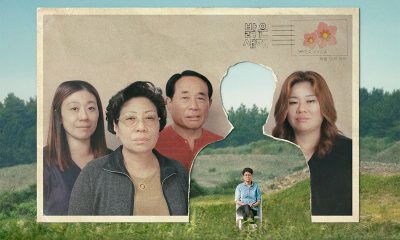
 a&e features5 days ago
a&e features5 days ago“I should have been there”: A queer Korean adoptee finds healing with original family members
-
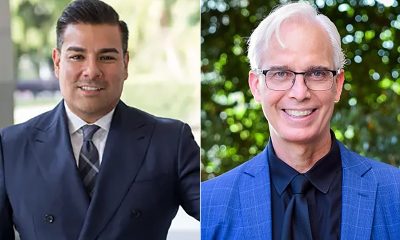
 California5 days ago
California5 days agoRicardo Lara, John Heilman inducted into Victory Institute’s Hall of Fame
-

 Television3 days ago
Television3 days ago‘Heated Rivalry’ is the gay hockey romance you didn’t know you needed
-
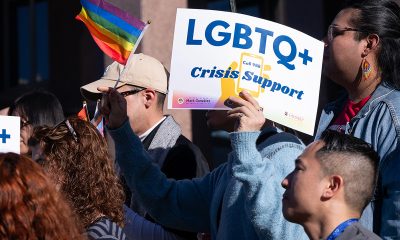
 LGBTQ+ Youth Mental Health4 days ago
LGBTQ+ Youth Mental Health4 days agoL.A. County officials advocate to reinstate “Press 3” crisis hotline for young queer people
-

 Los Angeles2 days ago
Los Angeles2 days agoRecent L.A. County report reveals record number of hate crimes against transgender and nonbinary community members
-

 Commentary3 days ago
Commentary3 days agoLove in the time of porn: a glimpse into the dating life of an adult performer
-

 Music & Concerts2 days ago
Music & Concerts2 days agoSalina EsTitties and GMCLA are primed and ready for this weekend’s ‘Holiday Legends’
-

 Books12 hours ago
Books12 hours agoThe best books to give this holiday season
-
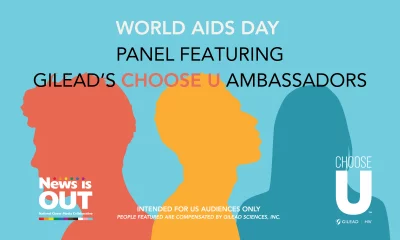
 Health20 hours ago
Health20 hours agoChoose U ambassadors share lived experiences with HIV, personal reflections, and insights




